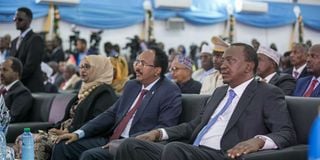ICJ rejects Kenya's request to delay Somalia maritime case

President Uhuru Kenyatta with Somali counterpart Mohamed Abdullahi Farmaajo during his inauguration ceremony in Mogadishu, Somalia.
What you need to know:
- Nairobi says its new legal team recruited in January last year has been unable to prepare due to travel restrictions imposed by authorities around the world to prevent the spread of Covid-19.
The International Court of Justice has declined Kenya’s request to delay a case in which Somalia has sued over a common maritime boundary.
In a note sent to parties on Saturday, the ICJ said the case will proceed from March 15, as scheduled, with oral proceedings lasting until March 19.
“Having duly considered the arguments presented by the parties, the court has decided to maintain the hearings as scheduled, in a hybrid format,” said the note from the ICJ Registrar Philippe Gautier.
The court said that despite Covid-19 guidelines on physical gatherings, “there is a possibility of a limited number of representatives of the parties to appear in person in the Great Hall of Justice, with the other representatives participating by video link."
On January 28, Kenya’s Attorney-General, Mr Kihara Kariuki, wrote to the ICJ requesting an indefinite delay of the case, citing the Covid-19 pandemic, which he said had hampered logistical preparations. Mr Kariuki said Kenya would be unable to defend itself “fairly, fully and transparently” if the scheduled hearing proceeded by video link.
Nairobi says its new legal team recruited in January last year has been unable to prepare due to travel restrictions imposed by authorities around the world to prevent the spread of Covid-19.
The team includes American Sean Murphy, Italian Tulia Treves, Makane Mbengue of Senegal, Laurence Boisson Chazournes of France, Christian Tams of Germany and Eran Sthoeger of Israel. They replaced a team that handled the case during confirmation hearings.
Kenya's arguments
Somalia sued Kenya at the ICJ, the UN’s top court, seeking to have their maritime boundary redrawn from the current easterly straight line from the land border to a south-easterly straight line. The area in question, about 100,000km2, is also said to have unexploited but lucrative hydrocarbons.
After the court confirmed jurisdiction over the case, Kenya requested three times for the case to be delayed. It was granted the delay from September to November 2019 and this was later pushed to June 2020 and then again to March 2021.
Kenya has also argued that there is a missing map authorities say is critical to its case.
“While the adverse effect of the pandemic has occasioned Kenya’s inability to access this document and other additional material evidence it had hoped to secure for presentation to the court in advance of the hearing, Kenya has, nevertheless, gathered significant evidence, which it wishes to present to the court,” Mr Kariuki wrote.
The missing map is said to indicate the actual flow of the maritime boundary with Kenya and was referenced in the maritime law that Somalia submitted.
Kenya and Somalia had relied on a colonial flow of the boundary and former Presidents Jomo Kenyatta and Siad Barre later reached a gentleman’s agreement to a status quo.
Before Somalia sued at the ICJ, both countries had negotiated and agreed to have the UN Commission on the Law of the Sea help them handle the matter. The bilateral agreement was rejected by Somalia’s then Transitional Federal Parliament in 2009.
The ICJ ruled that the bilateral agreement remained a valid treaty between the two countries, in spite of the parliamentary rejection, arguing Kenya and Somalia had nominated valid officials (then Foreign Minister Moses Wetangula and Somalia’s then Minister for Planning, Abdishakur Abdirahman) to sign the document.
But judges said this did not stop the court from hearing the case.
The judges are expected to issue a verdict following the oral hearings next month.





